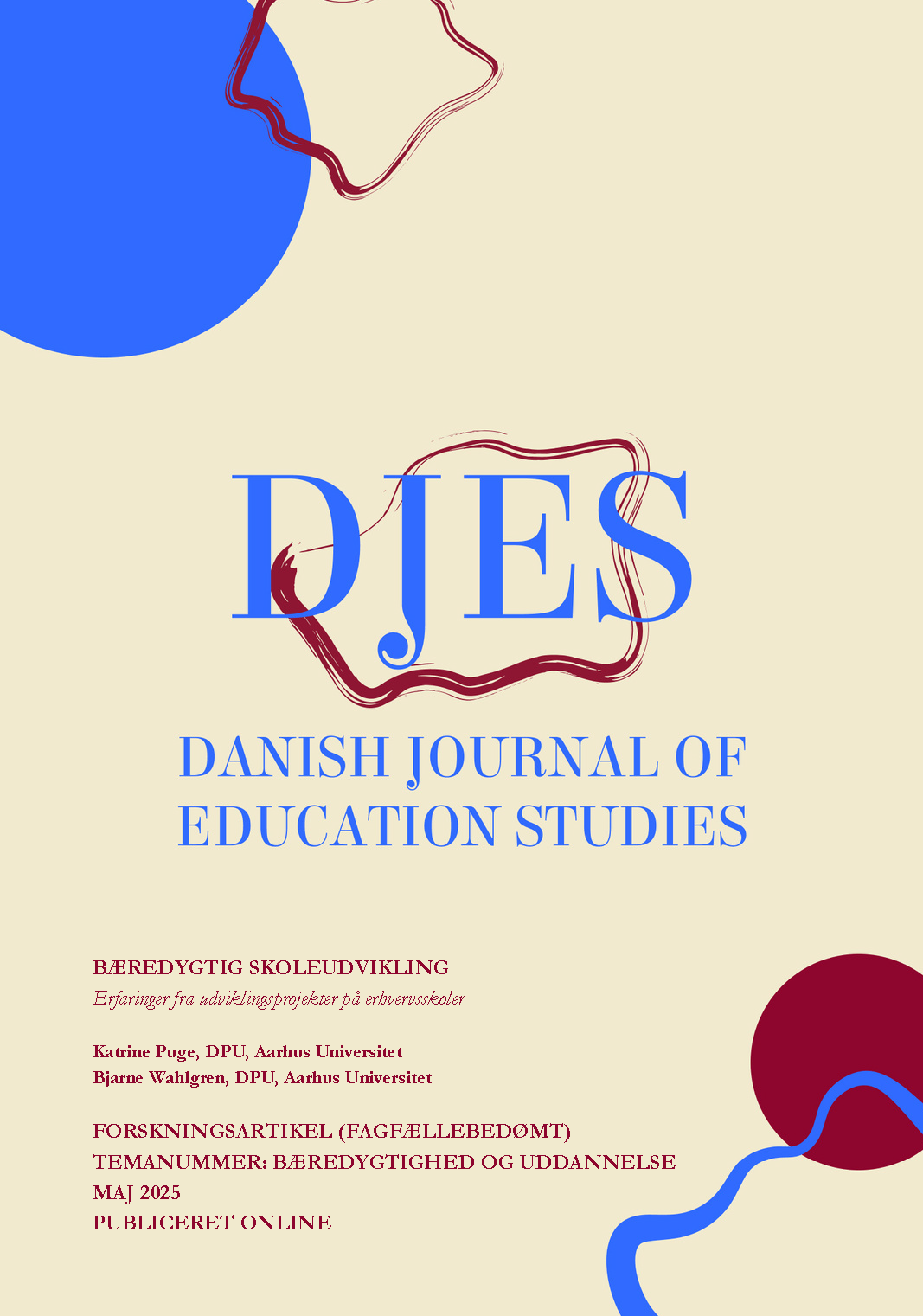Bæredygtig skoleudvikling
Erfaringer fra udviklingsprojekter på erhvervsskoler
DOI:
https://doi.org/10.7146/djes.v4i1.141534Nøgleord:
Skoleudvikling, Implementering, Forandringskapacitet, Læring, EvalueringResumé
Artiklen beskriver erfaringerne fra udviklings- og forskningsprojektet Sustainable Culture for Change, hvor en forskergruppe har støttet otte erhvervsskoleledelser i at gennemføre bæredygtig skoleudvikling. Først defineres bæredygtig skoleudvikling. Dernæst beskrives et koncept til at udvikle bæredygtig skoleudvikling. Vi viser, at konceptet styrker de faktorer, som ifølge forskningen kan fremme skolernes forandringskapacitet, idet det udvikler ledernes kapacitet til at handle reflekteret i forhold til udviklingsprocesser og til at inddrage lærerne i dette arbejde.
Referencer
Askell-Williams, H., & Koh, G. A. (2020). Enhancing the sustainability of school improvement initiatives. School effectiveness and school improvement, 31(4), 660-678. https://doi.org/10.1080/09243453.2020.1767657
Bell, D. (2008). Organisational planning and performance integration in a TAFE context. https://www.proquest.com/reports/organisational-planning-performance-integration/docview/764367724/se-2?accountid=14468https://soeg.kb.dk/discovery/openurl?institution=45KBDK_KGL&vid=45KBDK_KGL:KGL&genre=report&atitle=&author=Bell%2C+Denise&volume=&issue=
Bowen, G. L., Rose, R. A., & Ware, W. B. (2006). The Reliability and Validity of the School Success Profile Learning Organization Measure. Evaluation and program planning, 29(1), 97-104. https://doi.org/10.1016/j.evalprogplan.2005.08.005 (Evaluation and Program Planning)
Callan, V., Mitchell, J., Clayton, B., & Smith, L. (2007). Approaches for Sustaining and Building Management and Leadership Capability in VET Providers (192117045X).
Christensen, J. K. & Larsen, N. (red.), Bæredygtig udvikling og professionsdidaktiske nedslag. VIA University College
Ertsås, T. I., & Irgens, E. J. (2023). Developing organizational knowledge in schools: The role of theory and theorizing in collective capacity building. Journal of Educational Change, 24(1), 25-48. https://doi.org/10.1007/s10833-021-09433-3
Fullan, M. (2002). Principals as leaders in a culture of change. Educational Leadership. http://www.michaelfullan.ca/Articles_02/03_02.htm
Fullan, M. (2006). The future of educational change: system thinkers in action. Journal of Educational Change, 7(3), 113-122. https://doi.org/10.1007/s10833-006-9003-9
Fullan, M. (2016). The NEW meaning of educational change (Fifth edition. ed.). Teachers College Press.
Fullan, M. (2020). Leading in a Culture of Change (2 ed.). John Wiley & Sons, Incorporated.
Fullan, M., & Pinchot, M. (2018). The Fast Track to Sustainable Turnaround.(leadership strategies to transform a low-performing elementary school in California). Educational Leadership, 75(6), 48.
Gillon, A. C. (2018). The Nature of Contemporary Organization Development. Taylor and Francis. https://doi.org/10.4324/9781351106818
Hersom, H., & Sørensen, D. (2019). Forhindringer for samarbejde om pædagogisk udvikling mellem skoleledere og lærere: Belyst gennem et aktionsforskningsprojekt i erhvervsuddannelserne: [Obstacles to collaboration on educational development between school leaders and teachers: Seen through an action research project on vocational education and training]. Nordic Journal of Vocational Education and Training, 9(2), 132-155. https://doi.org/10.3384/njvet.2242-458X.1992132
Joroff, M. L., Porter, W. L., Feinberg, B., & Kukla, C. (2003). The agile workplace. Journal of corporate real estate, 5(4), 293-311. https://doi.org/10.1108/14630010310812145
Karagiorgi, Y., Afantiti-Lamprianou, T., Alexandrou-Leonidou, V., Karamanou, M., & Symeou, L. (2018). ‘Out of the Box’ leadership: action research towards school improvement. Educational Action Research, 26(2), 239-257. https://doi.org/10.1080/09650792.2017.1310052
Kenney, M., Jordan, K., & Curnow, M. (2019). Five steps to achieve sustainable culture and behaviour change. Peopletoo. https://peopletoo.co.uk/five-steps-to-achieve-true-culture-change-and-behaviour-change/
Koh, G. A., & Askell‐Williams, H. (2021). Sustainable school‐improvement in complex adaptive systems: A scoping review. Review of education (Oxford), 9(1), 281-314. https://doi.org/10.1002/rev3.3246
Kools, M., & Stoll, L. (2016). What Makes a School a Learning Organisation? OECD Publishing.
Kools, M., Stroll, L., George, B., Steijn, B., Gouëdard, P., & Bekkers, V. (2020). The school as a learning organisation: The concept and its measurement. European journal of education, 55(1), 24-42. https://doi.org/10.1111/ejed.12383
Lai, E. (2015). Enacting principal leadership: exploiting situated possibilities to build school capacity for change. Research Papers in Education, 30(1), 70-94. https://doi.org/10.1080/02671522.2014.880939
Lysgaard, J. A., & Haase, S. (2023). Uddannelse for bæredygtig udvikling på danske professionshøjskoler og universiteter. Tidsskrift for Professionsstudier, 18(35), 32–41. https://doi.org/10.7146/tfp.v18i35.135922,
McIntosh, P. (2010). Action research and reflective practice : creative and visual methods to facilitate reflection and learning. Routledge.
Nygaard, C., & Hørsted, A. (2016). Den agile skole. Om strategisk kvalitetsledelse i skolen. In Strategisk kvalitetsledelse i folkeskolen (1. udgave ed.). Samfundslitteratur.
Palmer, I., Dunford, R., & Buchanan, D. A. (2017). Managing organizational change : a multiple perspectives approach (3. edition. ed.). McGraw-Hill Education.
Puge, K., Lindhardt, L., & Wahlgren, B. (2023). Sustainable Culture for Change III. The Velux Foundations. https://epale.ec.europa.eu/system/files/2023-06/2023.working_paper_culture_f_change_III.pdf#
Schein, E. H. (2010). Organizational Culture and Leadership (4. Aufl. ed., Vol. 2). Jossey-Bass.
Seo, M. G., Putnam, L. L., & Bartunek, J. (2004). Dualities and Tensions of Planned Organizational Change. In M. S. Poole, A. H. Van de Ven, & M. E. Holmes (Eds.), Handbook of Organizational Change and Innovation. Oxford University Press, Incorporated.
Stoll, L. (2006). The future of educational change: system thinkers in action: response to Michael Fullan. Journal of Educational Change, 7(3), 123-127. https://doi.org/10.1007/s10833-006-0004-5
Stoll, L. (2009). Capacity building for school improvement or creating capacity for learning? A changing landscape. Journal of Educational Change, 10(2-3), 115-127. https://doi.org/10.1007/s10833-009-9104-3
Stoll, L. (2020). Creating capacity for learning: Are we there yet? Journal of Educational Change, 21(3), 421-430. https://doi.org/10.1007/s10833-020-09394-z
Stufflebeam, D. L., & Coryn, C. L. S. (2014). Evaluation theory, models, and applications (2nd ed., Vol. 50). Wiley.
Velux. (2018). INTRODUCTION TO THE VELUX FOUNDATIONS’ EUROPEAN VET DEVELOPMENT INITIATIVE 2018-28 https://veluxfoundations.dk/sites/default/files/introduction_to_the_velux_foundations_european_vet_development_initiative_2018-2028.pdf
Wahlgren, B., & Puge, K. (2022). The process of implementing an internal formative evaluation. CEPRA-striben(31), 52-61. https://doi.org/10.17896/UCN.cepra.n31.507

Downloads
Publiceret
Citation/Eksport
Nummer
Sektion
Licens
Copyright (c) 2025 Katrine Puge, Bjarne Wahlgren

Dette værk er under følgende licens Creative Commons Navngivelse (by).
https://creativecommons.org/licenses/by/4.0/




